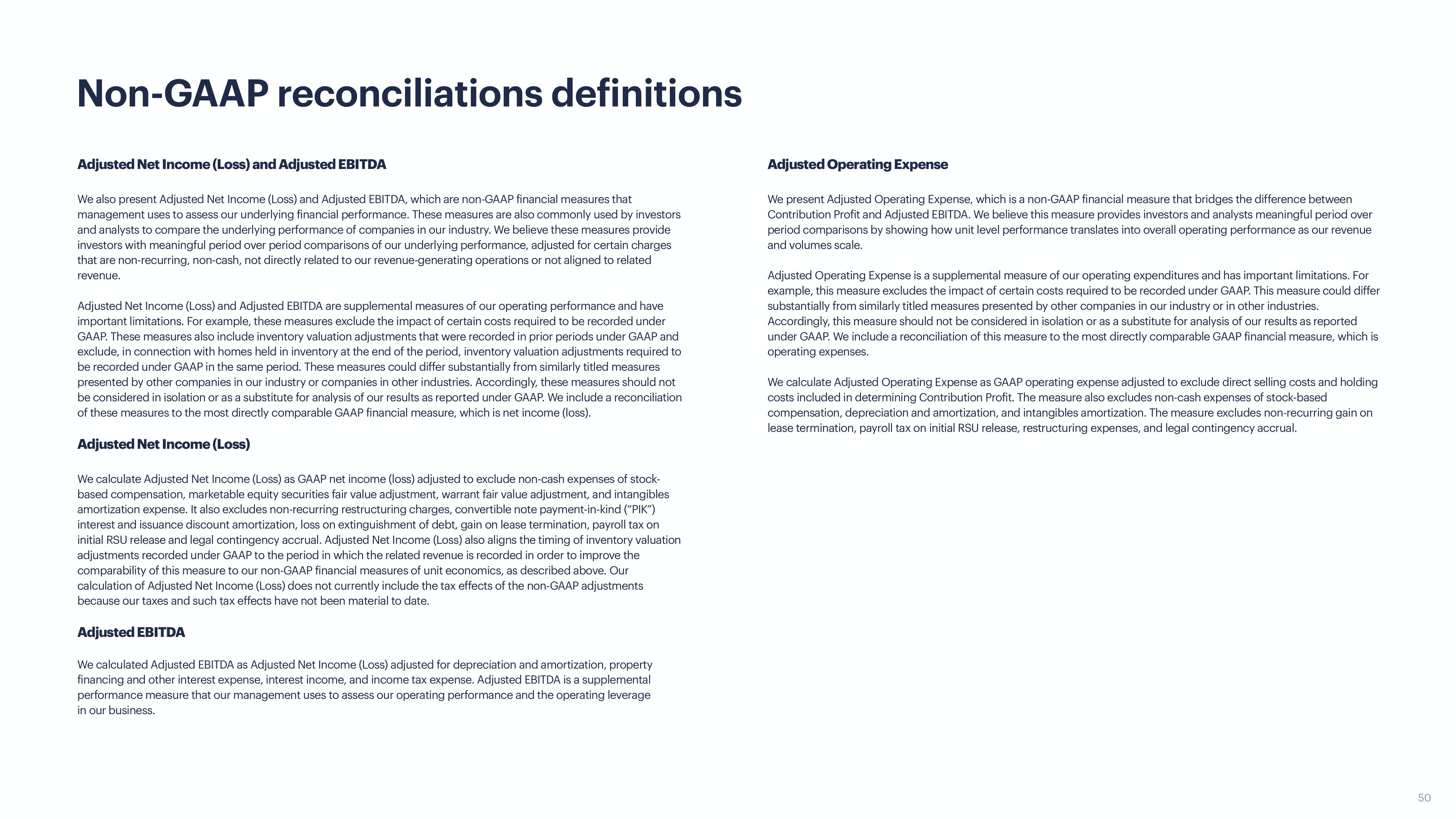Opendoor Investor Presentation Deck
Non-GAAP reconciliations definitions
Adjusted Net Income (Loss) and Adjusted EBITDA
We also present Adjusted Net Income (Loss) and Adjusted EBITDA, which are non-GAAP financial measures that
management uses to assess our underlying financial performance. These measures are also commonly used by investors
and analysts to compare the underlying performance of companies in our industry. We believe these measures provide
investors with meaningful period over period comparisons of our underlying performance, adjusted for certain charges
that are non-recurring, non-cash, not directly related to our revenue-generating operations or not aligned to related
revenue.
Adjusted Net Income (Loss) and Adjusted EBITDA are supplemental measures of our operating performance and have
important limitations. For example, these measures exclude the impact of certain costs required to be recorded under
AAP. These measures also include inventory valuation adjustments that were recorded in perio under GAAP and
exclude, in connection with homes held in inventory at the end of the period, inventory valuation adjustments required to
be recorded under GAAP in the same period. These measures could differ substantially from similarly titled measures
presented by other companies in our industry or companies in other industries. Accordingly, these measures should not
be considered in isolation or as a substitute for analysis of our results as reported under GAAP. We include a reconciliation
of these measures to the most directly comparable GAAP financial measure, which is net income (loss).
Adjusted Net Income (Loss)
We calculate Adjusted Net Income (Loss) as GAAP net income (loss) adjusted to exclude non-cash expenses of stock-
based compensation, marketable equity securities fair value adjustment, warrant fair value adjustment, and intangibles
amortization expense. It also excludes non-recurring restructuring charges, convertible note payment-in-kind ("PIK")
interest and issuance discount amortization, loss on extinguishment of debt, gain on lease termination, payroll tax on
initial RSU release and legal contingency accrual. Adjusted Net Income (Loss) also aligns the timing of inventory valuation
adjustments recorded under GAAP to the period in which the related revenue is recorded in order to improve the
comparability of this measure to our non-GAAP financial measures of unit economics, as described above. Our
calculation of Adjusted Net Income (Loss) does not currently include the tax effects of the non-GAAP adjustments
because our taxes and such tax effects have not been material to date.
Adjusted EBITDA
We calculated Adjusted EBITDA as Adjusted Net Income (Loss) adjusted for depreciation and amortization, property
financing and other interest expense, interest income, and income tax expense. Adjusted EBITDA is a supplemental
performance measure that our management uses to assess our operating performance and the operating leverage
in our business.
Adjusted Operating Expense
We present Adjusted Operating Expense, which is a non-GAAP financial measure that bridges the difference between
Contribution Profit and Adjusted EBITDA. We believe this measure provides investors and analysts meaningful period over
period comparisons by showing how unit level performance translates into overall operating performance as our revenue
and volumes scale.
Adjusted Operating Expense is a supplemental measure of our operating expenditures and has important limitations. For
example, this measure excludes the impact of certain costs required to be recorded under GAAP. This measure could differ
substantially from similarly titled measures presented by other companies in our industry or in other industries.
Accordingly, this measure should not be considered in isolation or as a substitute for analysis of our results as reported
under GAAP. We include a reconciliation of this measure to the most directly comparable GAAP financial measure, nich
operating expenses.
We calculate Adjusted Operating Expense as GAAP operating expense adjusted to exclude direct selling costs and holding
costs included in determining Contribution Profit. The measure also excludes non-cash expenses of stock-based
compensation, depreciation and amortization, and intangibles amortization. The measure excludes non-recurring gain on
lease termination, payroll tax on initial RSU release, restructuring expenses, and legal contingency accrual.
50View entire presentation